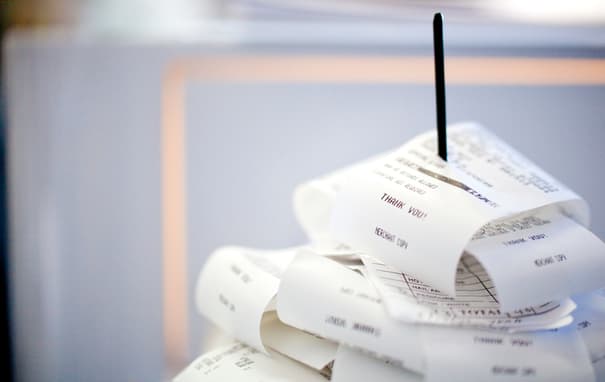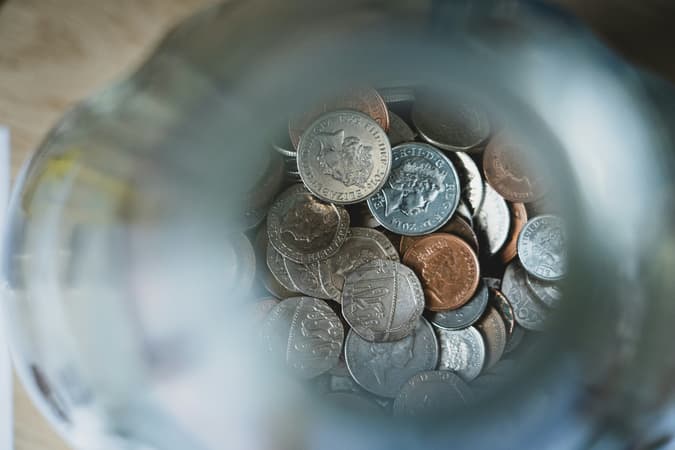Jump to a section
Are you drowning in a sea of credit card receipts? Wondering how long you should keep them? We've got the answers you need!
In the UK, HMRC requires businesses to keep records of financial transactions for at least six years. Failing to follow these requirements could lead to penalties and fines.
Proper record-keeping is not only important for tax reasons and bookkeeping, but for understanding your outgoings and your team’s expenses. From coffee runs to office expenses, every receipt matters.
What receipts do I need to keep?
HMRC tells business owners to keep receipts for any business expenses and sales. This includes money coming both in and out. The receipts you may need to keep include:
-
Expense receipts: This covers everything from train tickets for business travel, to software and subscription fees.
-
Invoices: Keep both invoices you have issued and received.
-
Bank and credit card statements: This includes all business accounts you have, whether they’re credit or debit accounts.
-
Personal income records: Keep the records of how much pay you have taken home
-
VAT records: If your business is VAT registered, keep a record of your VAT invoices
Do I need to keep the paper receipts?
No, you don’t need to worry about keeping all the paper copies of your receipts. Lots of the receipts small business owners give and receive now are digital anyway. However, if you do receive a paper receipt, you can take a picture or scan it to keep a copy.
In your Capital on Tap app or online portal, you can seamlessly attach images of a receipt to a specific transaction in your account to keep a record of your business credit card receipts.
Understanding the importance of credit card receipts
As a small business owner, understanding the significance of credit card receipts is crucial for the smooth financial operation of your venture. Credit card receipts serve as essential documentation for financial transactions, ensuring accuracy, and transparency in your business dealings.
Customer proof of purchase
Firstly, credit card receipts provide vital proof of purchase for goods and services you have purchased for your business. It's really important to keep an eye on these receipts because they help you keep a clear record of every transaction that happens in your business.
Fraudulent chargebacks
In the UK, customers have the right to initiate a chargeback on their credit card up to 13 months after purchase for cases of suspected fraud, and up to 120 days from the purchase or expected delivery date for goods or services not received. By keeping well-organised credit card receipts, you can have solid evidence of the transactions, safeguarding your business against potential fraudulent chargeback claims by proving the purchase was authorised by the customer.
Tax reporting
Additionally, credit card receipts play a crucial role in tax reporting and audits. Maintaining organised records of credit card transactions can make tax reporting more manageable and help you avoid discrepancies during audits. These receipts act as supporting documents, ensuring that all transactions are accounted for and that your financial records are in good order.
By understanding the importance of credit card receipts, small business owners can protect their interests and financial stability. Maintaining comprehensive and organised records of transactions not only prevents potential fraud and chargebacks but also assists in maintaining financial transparency and compliance. Therefore, make it a priority to implement efficient systems for documenting credit card transactions, as it can significantly impact the success and longevity of your business.
Requirements for retaining credit card receipts
HMRC requires limited companies to keep records for 6 years from the end of the last company financial year they relate to, or longer if:
-
Receipts show a transaction that spans more than one accounting period
-
You bought something you expect to last longer than 6 years, like equipment or machinery
-
You sent your Company Tax Return late
-
HMRC starts a compliance check into your Company Tax Return
If you don’t keep your credit card receipts for the expected time, HMRC can take action up to and including fines and disqualifying directors from the business.
If you haven’t got these accounting records because they were, for example, lost, stolen or destroyed, and can’t be replaced, you must inform the HMRC Corporation Tax Office straight away and include this information in your Tax Return.
Recommended credit card receipt retention periods
For sole traders, it is recommended that you keep credit card receipts for 5 years, and 6 years if you’re a limited company. This is because HMRC can ask to see your records within this time period.
Keep in mind that HMRC can investigate your tax returns from the past 20 years if they suspect any tax issues or avoidance. So, if you've ever filed your taxes late, been investigated before, or are currently being investigated, make sure to keep all your tax-related documents and records safe, and keep them for 20 years. To be extra safe, you can make a copy of your documents.
Best practices for credit card receipt storage and security
HMRC doesn't have strict rules for record-keeping, but it emphasises accuracy, accessibility, and legibility. If your business falls under Making Tax Digital (MTD) requirements,you are required to keep invoices digitally; otherwise, you can use digital or hard copies. The key is to maintain accurate, accessible, and readable records. So, here are some helpful tips to securely store and organise credit card receipts.
-
Embrace technology: Simplify your record-keeping process by using technology and accounting software that seamlessly links receipts with your bank account and accountant. Utilising platforms like Capital on Tap allows you to attach receipts to transactions and grant your accountant access to download all records at once, whilst also syncing to your preferred accounting software platform including QuickBooks, Xero, and FreeAgent.
-
Digital storage solutions: Save space and enhance your data security by opting for digital storage systems. You can scan receipts or utilise user-friendly apps to ensure HMRC's readability requirements are met. Cloud-based solutions offer the added advantage of accessing records anytime, anywhere, and safeguarding against data loss in case of hardware failure.
-
Data privacy: Safeguarding customer information is paramount. Make sure you understand and follow data protection laws and implement stringent measures to secure sensitive credit card data. Regularly review your security protocols and seek professional guidance to stay ahead of evolving threats.
-
Secure disposal of credit card receipts: When credit card receipts are no longer needed, you must prioritise their safe disposal. Consider shredding the receipts for basic protection. For additional assurance, burn the shredded remains or pay for professional services specialising in secure document destruction. For digital records, use reputable data erasing software that leaves the files unrecognisable.
The bottom line
To ensure smooth financial operations and protect business interests, it is recommended that businesses keep credit card receipts for at least 5 years for sole traders and 6 years for limited companies. Embracing technology and using secure digital storage solutions can simplify record-keeping, enhance data security, and make following HMRC requirements more manageable.
These receipts not only serve as vital proof of purchase for customers, safeguarding against potential fraudulent chargeback claims, but also play a crucial role in tax reporting and audits. Maintaining comprehensive and organised records of credit card transactions ensures financial transparency, compliance, and accurate bookkeeping. Failure to follow HMRC's retention requirements can result in penalties, fines, and even disqualification as a company director.
Making credit card receipt retention a priority is essential for any responsible and forward-thinking business owner.
This does not constitute financial or legal advice. If you wish to understand your tax record responsibilities in more detail, discuss this with a financial advisor or accountant.
The information referred to in this post is current as at 08 August 2023











